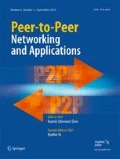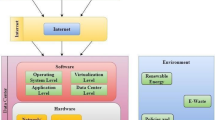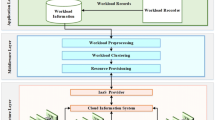Abstract
Effectively resource management in the cloud environment can improve the utilization of resource and reduce resource costs and overheads.Task scheduling and optimization within the cloud computing environment are one of the main concerns that need to be handled to increase resource utilization and QoS (Quality of Service). Although there are some algorithms have been proposed to handle the problem of task scheduling, existing methods mainly focus on reducing the task execution time while ignoring the other factors such as workload balance and QoS. In this paper, we put forward a novel algorithm named ITSA (Improved Task Schedule Algorithm), which is based on the gain value of task swap and performs “task pair” scheduling by utilizing the greedy strategy. The main idea of ITSA can be concluded as follows: Firstly, we present the concept of the gain value of task swap; then, we bind task with the minimum gain value and task with the maximum gain value together to form a “task pair”, and perform scheduling by adopting the greedy strategy. Finally, we evaluate the proposed algorithm by extensive experiment, and the data obtained from the experiment shows that the proposed algorithm has a better performance compared with other algorithms in terms of the workload balance and QoS.




Similar content being viewed by others
References
Kianfar K, Moslehi G, Yahyapour R (2015) A novel metaheuristic algorithm and utility function for QoS based scheduling in user-centric grid systems. J Supercomput 71(3):1143–1162
Juarez F, Ejarque J, Badia RM (2018) Dynamic energy-aware scheduling for parallel task-based application in cloud computing. Futur Gener Comput Syst 2018(78):257–271
Hameed A, Khoshkbarforoushha A, Ranjan R et al (2016) A survey and taxonomy on energy efficient resource allocation techniques for cloud computing systems. Computing 98(7):751–774
Zhou Z, Abawajy J, Fangmin L et al (2018) Fine-grained energy consumption model of servers based on task characteristics in cloud data center. IEEE Access 6(1):27080–27090
Zhu D, Chen L, Yue S et al (2016) Providing balanced mapping for multiple applications in many-Core Chip multiprocessors. IEEE Trans Comput 65(10):3122–3135
Saribatur ZG, Patoglu V, Erdem E (2018) Finding optimal feasible global plans for multiple teams of heterogeneous robots using hybrid reasoning: an application to cognitive factories. Auton Robot 12:1–26
Ismail L, Materwala H (2018) Energy-aware VM placement and task scheduling in cloud-IoT computing: classification and performance evaluation. IEEE Internet of Things Journal. https://doi.org/10.1109/JIOT.2018.2865612
Hameed A, Khoshkbarforoushha A, Ranjan R et al (2016) A survey and taxonomy on energy efficient resource allocation techniques for cloud computing systems. Computing 98(7):751–774
Zuo L, Dong S, Shu L et al (2018) A multiqueue interlacing peak scheduling method based on tasks’ classification in cloud computing. IEEE Syst J 12(2):1518–1530
Panda SK, Gupta I, Jana PK (2017) Task scheduling algorithms for multi-cloud systems: allocation-aware approach. Inf Syst Front:1–19
Dhinesh BLD, Krishna PV (2013) Honey bee behavior inspired load balancing of tasks in cloud computing environments. Applied Soft Computing Journal 13(5):2292–2303
Yang J, Jiang B, Lv Z, et al (2017) A task scheduling algorithm considering game theory designed for energy management in cloud computing. Futur Gener Comput Syst 2017, https://doi.org/10.1016/j.future.2017.03.024
Wang X, Wang Y, Cui Y (2016) An energy-aware bi-level optimization model for multi-job scheduling problems under cloud computing. Soft Comput 20(1):303–317
Aziza H, Krichen S (2018) Bi-objective decision support system for task-scheduling based on genetic algorithm in cloud computing. Computing 100(2):65–91
Xiong Y, Huang S, Wu M, et al (2017) A Johnson's-rule-based genetic algorithm for two-stage-task scheduling problem in data-centers of cloud computing. IEEE Transactions on Cloud Computing 2017, https://doi.org/10.1109/TCC.2017.2693187
Guo F, Yu L, Tian S et al (2015) A workflow task scheduling algorithm based on the resources' fuzzy clustering in cloud computing environment. Int J Commun Syst 28(6):1053–1067
Geng X, Mao Y, Xiong M et al (2018) An improved task scheduling algorithm for scientific workflow in cloud computing environment. Clust Comput 2018(6):1–10
Li Y, Chen M, Dai W et al (2017) Energy optimization with dynamic task scheduling Mobile cloud computing. IEEE Syst J 11(1):96–105
Guo S, Liu J, Yang Y et al (2018) Energy-efficient dynamic computation offloading and cooperative task scheduling in Mobile cloud computing. IEEE Trans Mob Comput 2018. https://doi.org/10.1109/TMC.2018.2831230
Shah-Mansouri H, Wong VWS, Schober R (2017) Joint optimal pricing and task scheduling in Mobile cloud computing systems. IEEE Trans Wirel Commun 16(8):5218–5232
Sfrent A, Pop F (2015) Asymptotic scheduling for many task computing in big data platforms. Inf Sci 319:71–91
Su S, Li J, Huang Q et al (2013) Cost-efficient task scheduling for executing large programs in the cloud. Parallel Comput 39(4):177–188
Zhu X, Yang LT, Chen H et al (2014) Real-time tasks oriented energy-aware scheduling in virtualized clouds. IEEE Transactions on Cloud Computing 2(2):168–180
Zhang W, Hu Y, He H et al (2017) Linear and dynamic programming algorithms for real-time task scheduling with task duplication. J Supercomput 2017(1):1–16
Safari M, Khorsand R (2018) PL-DVFS: combining power-aware list-based scheduling algorithm with DVFS technique for real-time tasks in cloud computing. J Supercomput 2018:1–23
Etminani K, Naghibzadeh MA (2007) min-min max-min selective algorithm for grid task scheduling, in: 3th IEEE/IFIP international conference in Central Asia on Internet 2007
Abdur R, Kashif J, Babri HA et al (2018) Selection of the most relevant terms based on a max-min ratio metric for text classification. Expert Syst Appl 2018(114):78–96
Hussain MSH, Shafie ALM, Mohammed A et al (2017) Performance comparison of heuristic algorithms for task scheduling in IaaS cloud computing environment. PLoS One 12(5):1–26
Calheiros RN, Ranjan R, Beloglazov A, Rose CAFD, Buyya R (2011) CloudSim: a toolkit for modeling and simulation of cloud computing environments and evaluation of resource provisioning algorithms. Software Practice & Experience 41(1):23–50
Zhou Z, Abawajy J, Chowdhury M, Zhigang H et al (2018) Minimizing SLA violation and power consumption in cloud data centers using adaptive energy-aware algorithms. Futur Gener Comput Syst (FGCS) 86(6):836–850
Acknowledgements
The research presented in this paper was supported by the scientific research project of education department of Hunan Province (Grant:18B412), the Natural Science Foundation of Hunan Province (Grant: 2019JJ50689), China Postdoctoral Science Foundation (Grant: 2018 M642974).
Author information
Authors and Affiliations
Corresponding author
Ethics declarations
Conflict of interests
The authors declare that they have no competing interests.
Additional information
Publisher’s note
Springer Nature remains neutral with regard to jurisdictional claims in published maps and institutional affiliations.
Rights and permissions
About this article
Cite this article
Zhou, Z., Wang, H., Shao, H. et al. A high-performance scheduling algorithm using greedy strategy toward quality of service in the cloud environments. Peer-to-Peer Netw. Appl. 13, 2214–2223 (2020). https://doi.org/10.1007/s12083-020-00888-4
Received:
Accepted:
Published:
Issue Date:
DOI: https://doi.org/10.1007/s12083-020-00888-4




